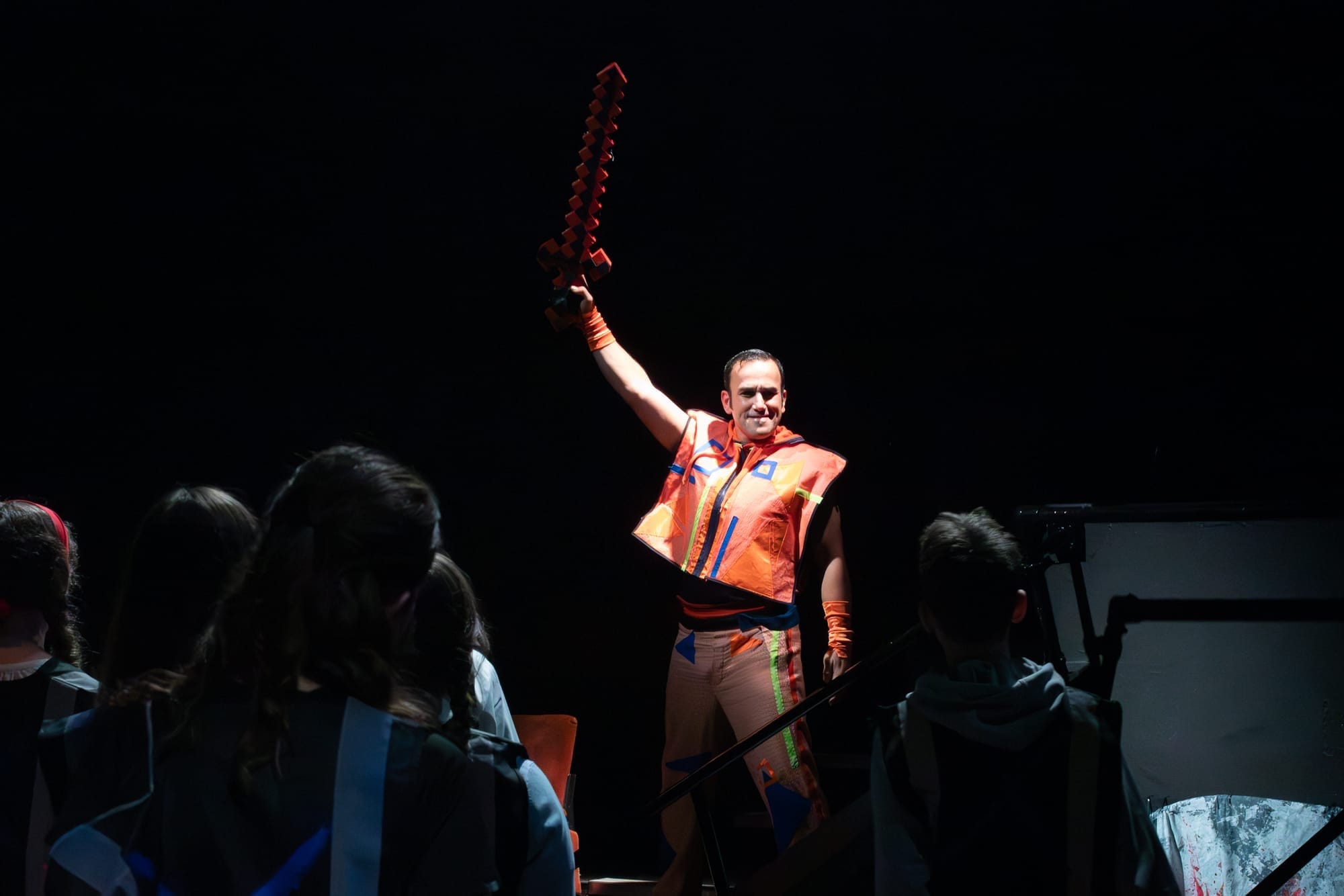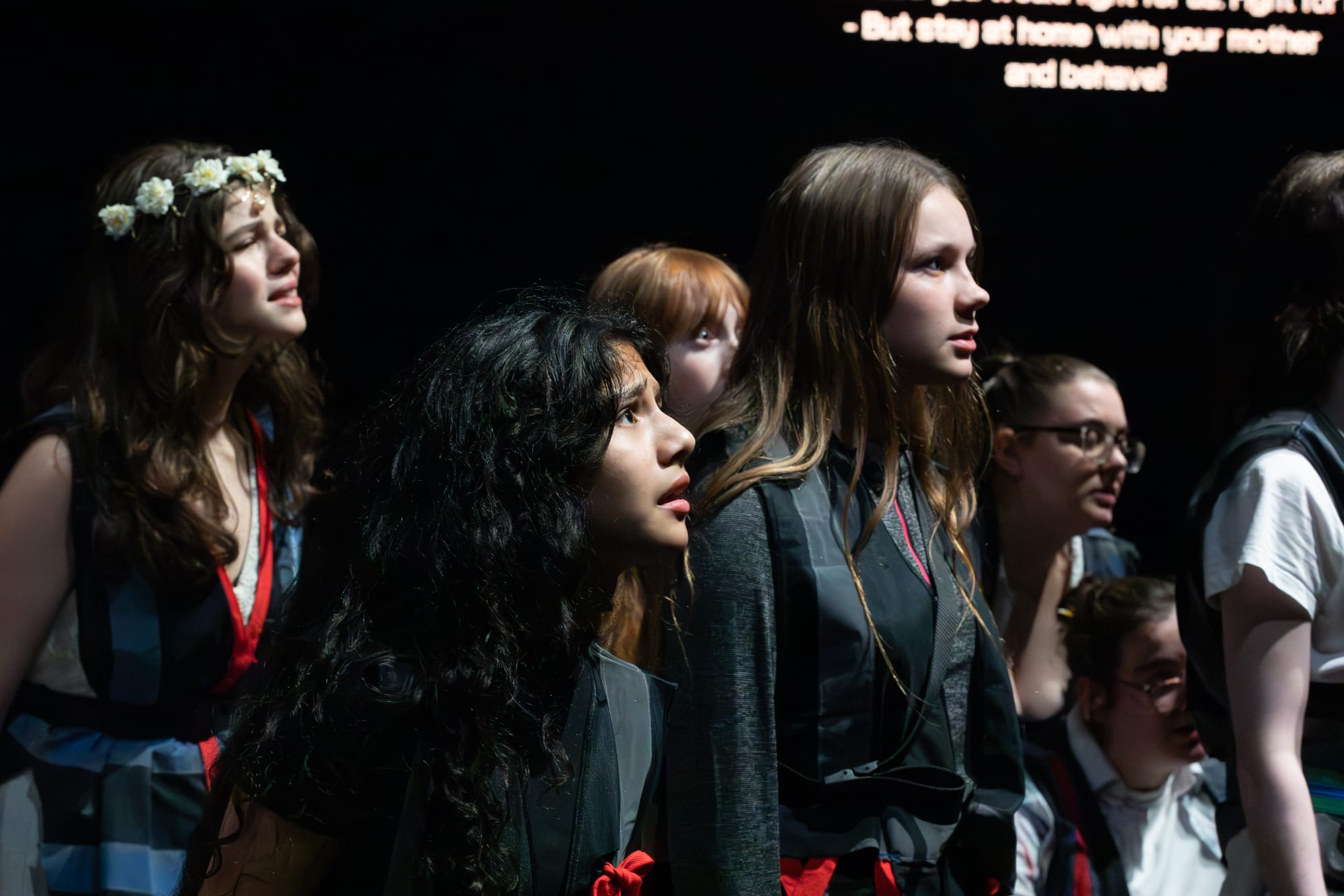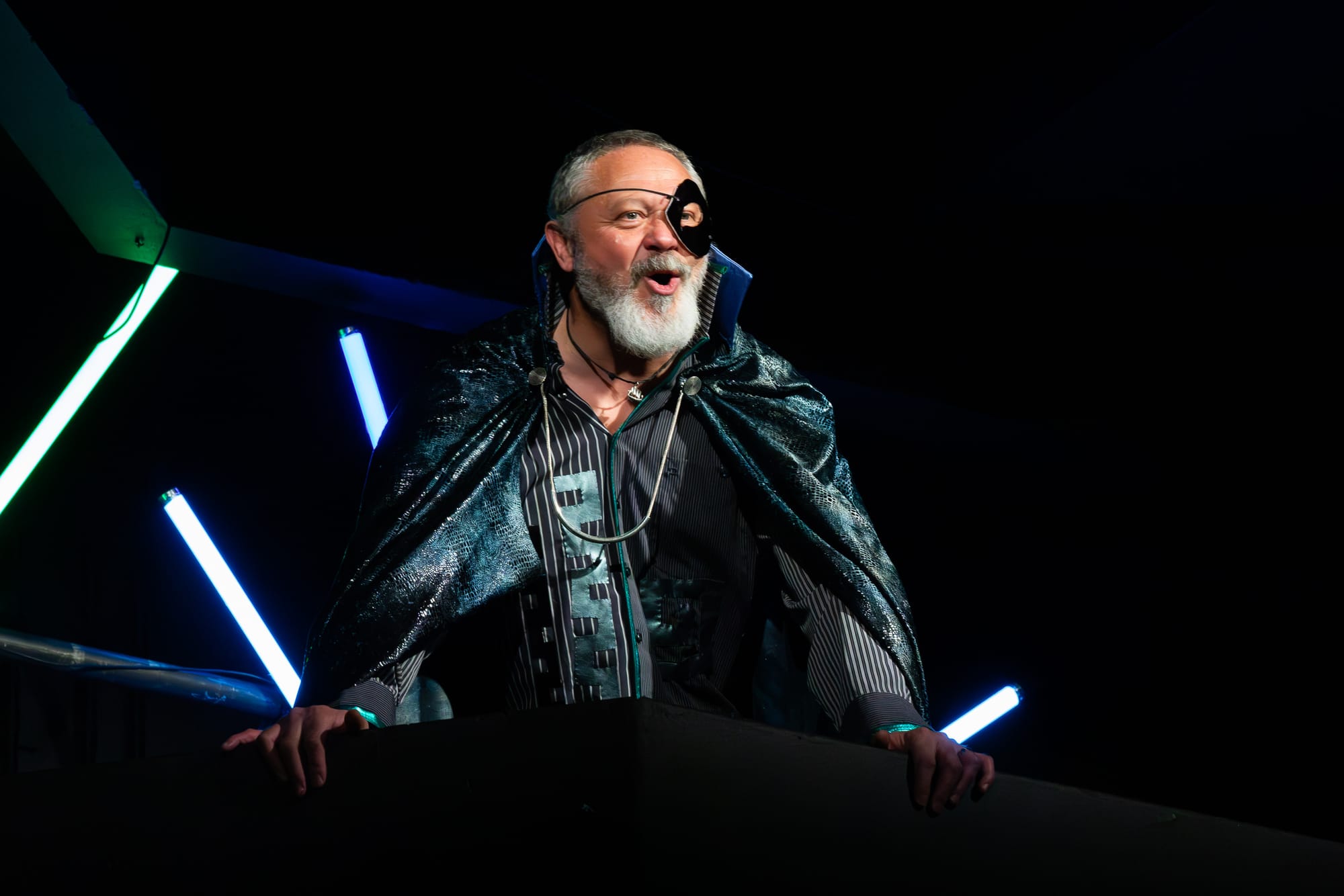
Dove (arr. Dove/Lyon) The Monster in the Maze Music Makers of Sheffield (including Ensemble 360, Consone Quartet, Bridge Ensemble, Sheffield Hub Senior Strings, Sheffield Youth Choirs and singers of Sheffield) / John Lyon (conductor). Crucible Theatr, Sheffield, 02.04.2024, 11am
Production:
Director – Rosie Kat
Designer – Fenna de Jonge
Lighting designer – Kati Hind
Chorus Costumes and Minotaur – Sheffield College
Cast:
Theseus – Anthony Flaum
Mother – Camille Maalawy
Daedalus – Robert Gildon
King Minos – Paul Hawkyard
Part of Music in the Round’s 40th birthday celebrations, this performance of Jonathan Dove’ community opera The Monster in the Maze was a triumph. After my predominantly negative impressions of Dove’s take on Simon Mayo’s Itch at Opera Holland Park last year, it was a relief to see just how Dove’s music and, just as importantly, his dramatic sense, can cohere.
The idea of community opera was thoroughly embraced by the participants. The Monster in the Maze was actually commissioned and first performed (in German) by the Berliner Philharoniker and Sir Simon Rattle.
One of Dove’s comments about the piece is particularly relevant to the Sheffield performance: ‘I went looking for a story that you could tell with groups of children and young people. The exciting thing about writing for amateurs is that they are getting to do something that they don’t do every day, all day, so there’s a particular energy and excitement which is somehow different to a professional group’
Here’s Music in the Round’s trailer:
That excitement, that vibe if you like, was what defined this Music in the Round event. Its all-inclusiveness (for both multi-aged audience and performers) was a vital part of its being, something underlined by the arrangement of Dove’s score by the composer and John Lyon to include upper strings, meaning the entirety of Sheffield Senior Strings could take part. Music in the Round’s ‘Bridge” programme has been significant here: it supports young musicians from backgrounds under-represented in chamber and classical music and here furnished a wind quintet that performed as part of the instrumental tutti.
The story is the famous Greek myth of the Minotaur and Theseus, but in this version it is sans Ariadne. King Minos operates as something of a narrator as well as ivtal character, positioned high up in the Crucible. Brass, representing the monster, grumbling low in their register, are positioned along the opposite wall, again high up. A carillon of bells acts as musical articulator within Minos’ storytelling, until the chorus enters.
And as to the chorus, rarely if ever have I heard such enthusiasm from a group of singers, who threw themselves into the occasion. Melodically more engaging than Itch, with some gestures real ear worms, Monster in the Maze is a decidedly better piece, which perhaps helps. And with such engagement form the young singers, it felt just perfect (it also felt more convincing than the chorus in the Rattle/Berlin performance on the BPO’s Digital Concert Hall, free at this link). Part of the Sheffield success was a keen rhythmic awareness from all concerned, testament to the attention Lyon obviously lavished on the score.

There are elements in Dove’s score one wishes were prevalent in opera generally, most obviously characters’ habit of introducing themselves in song, or announced in song elsewhere (‘It’s Theseus.” sings he chorus, helpfully, at one point). It makes it a whole lot easier.
The librettist, Alasdair Middleton, offers a tight, memorable text (the piece lasts almost exactly an hour). Dialogues between singers and chorus are expertly managed by the Middleton/Dove combination so that everything is intelligible (especially helped by the keen diction of the Sheffield singers: a special acknowledgement to the youngest, knee-high singers for this). The balance between a major, bloody Greek myth and a children’s daytime performance, in terms of costumes, set and real dramatic experience is a fine one and is well negotiated here. Lighting is particularly important in this piece for atmospherics, and Katt Hind’s lighting designs made the most of the Sheffield circle. Director Rosie Katt created miracles, maximising the effectiveness of Fenna de Jonge’s designs.
The singers were led by the superb Theseus of tenor Anthony Flaum, a recent graduate of the Royal Academy of Music and London’s National Opera Studio. With appearances at Grimeborn and both Grange Park (Roderigo Otello review) and The Grange, plus ENO (Borsa Rigoletto, review), his career is taking off nicely. He has a natural stage presence and his strong yet warm voice is perfect for Dove’s longer, more lyrical lines. A noble, manly adventurer here, his is the name from the cast I will most readily seek out going forwards.
Paul Hawkyard sings the important part of King Minos. This is a role for an actor (Hawkyard has appeared in a string of British soaps while, on stage, he has appeared in War Horse and South Pacific plus, back in 2012 took the role of Officer Lonnigan in Bernstein’s Wonderful Town with the Hallé in Salford 2013 (review). Hawkyard owned the entre space as he speaks.

The part of Daedalus requires a strong baritone and certainly found it here in Robert Gildon. Interestingly, Gildon and Anthony Flaum both sang in a production of Gilbert and Sullvan’s Utopia, Ltd in Buxton in 2022 (review). Gildon reveled in the opportunities Dove’s score offered. The only weak link in the chain was the Mother of Camille Maalawy. A mezzo (worth pointing out, as Operabase thinks she is a tenor), she suffered from some projection issues at the start, recovering later.
A minor quibble, as were any slight wobbles of ensemble. This was a finely written opera that just happens to be for a community (as opposed to a Gebrauchsmusik ‘community opera’) and all credit to the Sheffield forces for doing Dove’s score such justice.
A triumph, then, and a heart-warming one, a that. You can learn more about Music in the Round’s activities via their extensive YouTube. Also very much worth mentioning is the initiative WeCompose, Music in the Round’s composition in schools project (Key Stages 3 & 4), a collaboration between composers, teachers and ensembles .
All photos © Andy Brown. Title photo is of Theseus (Anthony Flaum).









